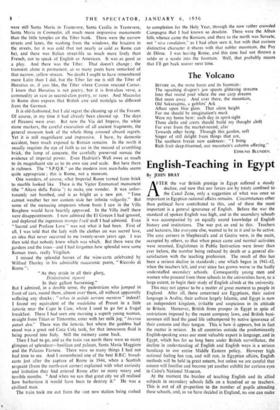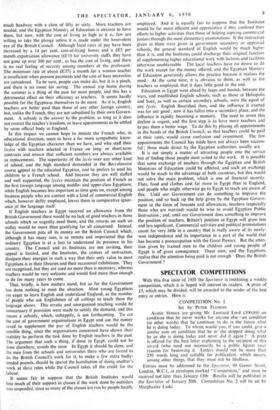English-Teaching in Egypt
By JOHN BRAY
AFTER the war British prestige in Egypt suffered a steady decline, and now that our forces are by treaty confined to - the Canal Zone, only a suggestion of what was once so important in Egyptian national affairs remains. Circumstances other than political have contributed to this, and of these the most important is a general ignorance of English. Before the war the standard of spoken English was high, and in the secondary schools it was accompanied by an equally sound knowledge of English history and institutions. The war put an end to this. Teachers and lecturers, like everyone else, wanted to be in it and to be active. The cosy corners in Shepheard's and at Gezira were, in the main, occupied by others, so that when peace came and normal activities were resumed, Englishmen in Public Instruction were fewer than ever before, the number being reduced by death or a general dis- satisfaction with the teaching profession. The result of this has been a serious decline in standards ; one which began in 1941-42, when the teachers left, and ever since has grown worse in the badly understaffed secondary schools. Consequently young men and women who proceed from these schools to the universities have, to a' large extent, to begin their study of English afresh at the university.
This may not appear to be a matter of great moment to people in England. After all, those concerned are Egyptians, their native language is Arabic, their culture largely Islamic, and Egypt is now an independent kingdom, irritable and suspicious in its attitude to Britain. Moreover, British firms prosper in Egypt in spite of restrictions imposed by the recent company laws, and British busi- nessmen still lead the good life unhampered by native ignorance of their customs and their tongue. This is how it appears, but in fact the matter is serious. In all countries outside the predominantly. English-speaking areas our most valuable export is language, and in Egypt, which has for so long been under British surveillance, the decline in understanding of English and English ways is a serious handicap to our entire Middle Eastern policy. However high national feeling has run, and will run, in Egyptian affairs, English methods will be held in, great esteem, but unless we are careful that esteem will fossilise and become yet another exhibit for curious eyes in Cairo's National Museum.
At the moment the burden of teaching English and its allied subjects in secondary schools falls on a hundred or so teachers.. This is out of all proportion to the number of pupils attending these schools, and, as we have decided in England, no one can make much headway with a class of fifty or sixty. More teachers are needed, and the Egyptian Ministry of Education is anxious to have them, but now, with the cost of living as high as it is, few are willing to take the plunge unless it is made under the benevolent eye of the British Council. Although local rates of pay have been increased by a 14 per cent. cost-of-living bonus and a £E5 per month expatriation allowance (£E10 for university staff), they have not gone up over 300 per cent., as has the cost.of living, and there is no real feeling of security among members of the profession. The minimum rate of about £E371- a month for a woman teacher is insufficient when pension payments tind the cast of bare necessities are considered. To be sure, people can make do, but it is a pinch, and there is no room for saving. The annual trip home during the summer is a thing of the past for most people, and this has a detrimental effect on their efficiency as teachers. It seems hardly possible for the Egyptians themselves to do more. As it is, English teachers are better paid than those of any other foreign country, but, unlike the French, they are not subsidised by their own Govern- ment. A subsidy is the answer to the problem, as long as it does not restrict the teacher's freedom, or leave appointments to be settled by some official body in England.
In this respect we cannot hope to imitate the French who, in educational direction, seem to have a far more sympathetic know- ledge of the Egyptian character than we have, and who staff their lycies with teachers selected in France on long- or short-term contracts and ensure that sufficient numbers are always available as replacements. The superiority of the lycee over any other kind of school, and the high standard demanded in the Baccalaureat course weal to the educated Egyptian, and he prefers to send his children to a French school. And because they are well staffed and well supported, the lycies maintain the position of French as the first foreign language among middle- and upper-class Egyptians, while English becomes less important as time goes on, except among business people who are content with a kind of commercial English which, however deftly employed, leaves them in comparative ignor- ance of the language itself.
If English teachers in Egypt received an allowance from the British Government there would be no lack of good teachers in those schools which so urgently need them, and the returns on such an outlay would be more than gratifying for all concerned. Instead, the Government puts all its money on the British Council which, although it has many uses, is so remote and impersonal that the ordinary Egyptian is at a loss to understand its presence in his country. The Council and its Institutes are not inviting, their appeal is limited, and the Institutes, the centres of instruction, dissipate their energies in such a way that their only value to most Egyptians is in their libraries and their occasional exhibitions. They are recognised, but they are used no more than is necessary, whereas teachers would be very welcome and would find more than enough to do for many years to come.
That, briefly, is how matters stand, but so far the Government has done nothing to meet the situation. Most young Egyptians are eager to learn English and understand England, as the number of people who ask Englishmen of all callings to teach them the language shows. This erratic and unorganised teaching would be unnecessary if provision were made to satisfy the demand, and this means a subsidy, which, unhappily, is not forthcoming. To cut the cost of government organisations in Egypt and use the money saved to supplement the pay of English teachers would be the sensible thing, since the organisations concerned have shown their inability to perform the task done by English teachers in the past. The argument that such a thing, if done in Egypt, could not be done elsewhere, avoids the issue. In Egypt it should be done, and the men from the schools and universities there who are forced to do the British Council's work. for it, to make a few extra badly- needed pounds, should be spared the humiliation of doing another's work at slave rates while the Council takes all the credit for the labour.
It seems fair to suppose that the British Institutes would lose much of their support in classes if the work done by outsiders was suspended, since so many of the classes are run by people locally
employed. And it is equally fair to suppose that the Institutes would be far more efficient and appreciative if they confined their efforts to higher activities than those of helping aspiring commercial juniors through the most elementary examinations. If the instruction given in them were given in government secondary or approved schools, the general standard of English would be much higher than it is, and the Institutes could discharge their original function of supplementing higher educational work with lectures and facilities otherwise unobtainable. The local teachers have no desire to do the work except for the money offered, and the Egyptian Ministry of Education generously allows the practice because it realises the need. At the same time, it is obvious to them, as well as the teachers so employed, that it does little good in the end.
Education in Egypt went ahead by leaps and bounds between the wars, and established English schools, such as those at Heliopolis and Sue; as well as certain secondary schools, were the equal of any lycie. English flourished then, and the influence it exerted was for our good ; now it has fallen into a secondary place, and the influence is rapidly becoming a memory. The need to arrest this decline is urgent, and the first step is to have more teachers and to pay them a better wage. To do this by placing all appointments in the hands of the British Council, so that teachers could be paid at their rates, would cause confusion and resentment. The few appointments the Council has made have not always been success- ful ; those made direct by the Egyptian authorities usually are.
It is not simply a matter of attracting people into the service but of finding those people most suited to the work. It is possible that some exchange of teachers through the Egyptian and British Ministries of Education could be affected, and such an exchange would be much to the advantage of both countries, but this would not solve the main problem, which is one of financial security. Flats, food and clothes cost far more in Egypt than in England, and people who might otherwise go to Egypt to teach are aware of this. Until our Government can do something to improve the position, and so back up the help given by the Egyptian Govern- ment in the form of bonuses and allowances, teachers (especially those who are married) would be wise to avoid Egyptian Public Instruction ; and, until our Government does, something to improve the position of teachers, Britain's position in Egypt will grow less and less significant. Commercial activities and political protestations count for very little in a country that is really aware of its newly- won independence and its importance in a part of the world that has become a preoccupation with the Great Powers. But the atten- tion given by trained men to the children and young people of Egypt is of great consequence. These men, and the Egyptians, realise that the attention being paid is not enough. Does the British Government ?







































 Previous page
Previous page